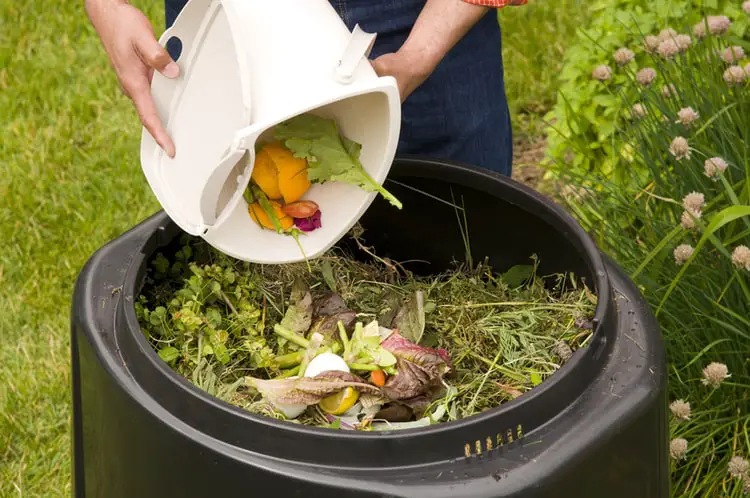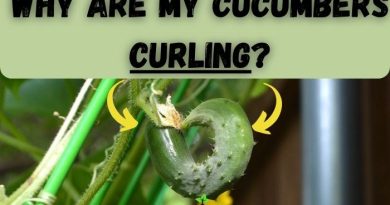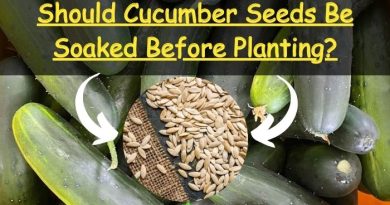Can You Compost Cucumber? Everything You Need To Know!
Composting is a great way to reduce waste and create nutrient-rich soil for your garden. However, not all organic materials are suitable for composting. If you’re a gardener who grows cucumber, you may wonder if you can add cucumber scraps to your compost pile.
Can You Compost Cucumber?
Yes, you can compost cucumber! Cucumber is a fantastic addition to your compost pile, helping reduce kitchen waste and enriching your garden soil with valuable nutrients. Simply collect your cucumber waste, layer it in your compost bin, and maintain moisture levels by adding water as needed. With proper maintenance, your cucumber waste will decompose naturally over time and produce nutrient-rich compost that can be used to enrich the soil in your garden or potted plants.
For faster composting, try chopping or shredding cucumber scraps into smaller pieces. Smaller particles break down more quickly, expediting the composting process.
Achieving successful composting requires a balanced ratio of green (nitrogen-rich) and brown (carbon-rich) materials. Cucumbers provide nitrogen, so team them up with brown materials like dried leaves, straw, or shredded newspaper.
Microorganisms feed on the materials added to the compost pile during the composting process, and the end product is a dark, crumbly, earthy-smelling material that is beneficial for garden soil.
This perfect balance ensures efficient decomposition and yields nutrient-rich compost for your garden. Happy composting!
What Cucumber Parts to Compost
- Cucumber Peels: Toss in those cucumber peels—they add essential nutrients to the compost.
- Cucumber Seeds: Yes, compost the seeds too! They aid in the breakdown process.
- Cucumber Pulp: After juicing or processing cucumbers, compost the leftover pulp for added richness.
- Other Edible Parts: Don’t waste any edible parts; they all contribute to good compost.
Like all kitchen scraps, cucumber peels and seeds should be added to the compost pile in moderation. Too much of one type of material can upset the balance of the compost and slow down decomposition.
Can you compost cucumber vines?
Yes, you can compost cucumber vines. Cucumber vines are great additions to your compost pile, as they provide organic matter that breaks down and enriches your compost with nutrients. Be sure to cut or shred the vines into smaller pieces to help them decompose more efficiently.
It’s essential to balance your compost with a mix of green (nitrogen-rich) and brown (carbon-rich) materials for optimal decomposition. Cucumber vines, being green materials, add nitrogen to the compost, so pairing them with brown materials like dry leaves or straw is a good practice.
Can you compost cucumber leaves?
Yes, you can compost cucumber leaves. Cucumber leaves are a valuable addition to your compost pile. They provide organic material that decomposes and enriches your compost with essential nutrients.
To compost cucumber leaves effectively, shred or chop them into smaller pieces, which will help speed up the decomposition process. It’s important to maintain a balanced ratio of green (nitrogen-rich) and brown (carbon-rich) materials in your compost.
Cucumber leaves, being green materials, contribute nitrogen, so pairing them with brown materials like dry leaves, straw, or cardboard helps ensure a well-balanced compost pile.
Benefits of Composting Cucumbers
As a gardener, I’ve discovered that composting cucumbers is a method to enhance soil fertility by providing essential nutrients while also minimizing the environmental impact of waste disposal.
Composting cucumbers offers advantages that contribute to waste reduction and support the growth of plants:
1. Waste Reduction and Environmental Impact
Composting cucumbers presents an opportunity to decrease waste generation and reduce the impact on landfills.
By composting cucumbers, they decompose into nutrients that can nourish the soil. This process plays a role in diminishing landfill usage, ultimately benefiting our environment.
2. Nutrient Enrichment for Soil
Another benefit of composting cucumbers lies in enriching the soil with nutrients. Cucumbers contain potassium, phosphorus and nitrogen— elements for plant growth.
When cucumber waste is composted, these nutrients are released into the soil enhancing its fertility and facilitating plant development.
3. Supporting Robust Plant Growth
Promoting robust plant growth is another advantage of composting cucumbers. Through cucumber composting, we obtain humus that serves as an excellent fertilizer for your cucumber plants.
This nutrient-dense compost feeds cucumber plants, fostering their health and fortifying their root systems.
What Type of Cucumbers to Avoid Composting
- Treated or Waxed Cucumbers: Skip-treated or waxed cucumbers because it can hinder composting.
- Non-Organic Cucumbers: Opt for organic cucumbers to avoid pesticide residues in your compost.
While cucumbers themselves are compostable, it is essential to avoid composting treated or waxed cucumbers. Many store-bought cucumbers have wax coatings or chemical treatments to extend shelf life.
These treated cucumbers may contain harmful substances that can disrupt the composting process or introduce toxins into the compost.
How to Compost Cucumbers Step by Step

Step 1: Gather Composting Materials
Collect all of the cucumber waste from your kitchen, including the peels, seeds, and any leftover pieces of the vegetable or waste like fruit and vegetable scraps, coffee grounds, and eggshells. You can also collect cucumber waste from your garden if you grow cucumbers.
You need to also gather brown materials like dried leaves, straw, shredded newspaper, or cardboard, which provide essential carbon for the composting process.
Step 2: Choose a Composting Method
Decide on a composting method that suits your space and needs, such as a compost bin, compost pile, or compost tumbler. Consider factors like space availability and composting frequency to make the best choice.
| Composting Method | Description | Pros | Cons |
|---|---|---|---|
| Compost bin | This involves adding cucumber waste to a compost bin or pile along with other organic materials and allowing it to decompose naturally over time. | This involves using worms to break down cucumber waste and other organic materials. | Can take several months for the compost to fully decompose. |
| Vermicomposting | Produces high-quality compost quickly, doesn’t require much space, and reduces waste. | Easy to do, doesn’t require any special equipment, and produces nutrient-rich soil. | Requires special equipment (a worm bin) and worms, may produce odors if not done correctly. |
| Trench composting | This involves burying cucumber waste and other organic materials directly in the soil. | Easy to do, doesn’t require any special equipment, produces nutrient-rich soil. | Can attract pests if not buried deep enough, may take longer for the compost to decompose. |
https://www.canr.msu.edu/resources/composting_a_smart_gardening_practice_to_recycle_garden_and_yard_waste
https://extension.oregonstate.edu/gardening/soil-compost/compost-backyard
Remember, there are many different ways to compost cucumber waste, so choose the method that works best for you and your situation. All of these methods can produce high-quality compost that will benefit your plants and reduce waste.
Step 3: Chop or Shred Cucumber Scraps
To speed up the composting time, I suggest you start chopping and shredding cucumber parts into smaller pieces. This is because smaller particles decompose faster and contribute to efficient compost breakdown.
Step 4: Set Up the Composting Area
Make sure to choose a proper location for your composting area, ensuring good drainage and accessibility for maintenance. If using a compost bin, place it on bare soil to allow beneficial organisms to access the compost from the ground.
Step 5: Layer Green and Brown Materials
Create a balanced compost pile by layering green and brown materials. Begin with a layer of brown materials at the bottom, followed by a layer of cucumber scraps, and continue alternating the layers.
Step 6: Keep the Compost Pile Moist
Maintain the right moisture level in the compost pile, similar to a wrung-out sponge. Add water if the pile becomes too dry or more brown materials if it becomes too wet.
Step 7: Turn the Compost Pile
Consistently try to turn the compost pile using a pitchfork or compost turner to provide oxygen to beneficial microbes and speed up decomposition. Aim to turn the pile every 1-2 weeks.
Step 8: Monitor your Compost
Regularly monitor the compost pile for any unpleasant odors, which might indicate an imbalance. Adjust the green-to-brown ratio and add more brown materials if needed.
Step 9: Verify Compost Maturity
The compost is ready when it turns dark, crumbly, and has an earthy smell. Composting time can vary from several weeks to months, depending on the method and environmental conditions.
Alternative Composting Methods for Cucumbers
Composting with Worms
I’ve discovered that if you want to compost cucumber using worms can be quite beneficial. This approach, also known as vermicomposting is a way to break down cucumber and transform it into rich soil.
To begin I suggest using a designed worm bin for composting purposes. These bins typically consist of several layers that allow the worms to freely navigate through the compost.
When composting cucumber with worms it’s essential to cut the cucumber into pieces to aid the decomposition process made by the worms. Additionally, I recommend including materials, like shredded newspaper or leaves, in the bin to provide the worms with more food sources.
It is important for you to keep the worm bin moist, but not too wet. If the bin becomes too wet, it can lead to anaerobic conditions and a foul odor. I recommend checking the moisture level of the bin regularly and adding water as needed.
Anaerobic Composting
Anaerobic composting is another option for composting cucumber. This method involves creating a sealed environment that does not allow for oxygen to enter. As a result, the cucumber breaks down through a process of fermentation.
To start, I recommend placing the cucumber in a sealed container, such as a plastic bin or a compost tumbler. It is important to add a small amount of water to the container to help kickstart the fermentation process.
It is important to note that anaerobic composting can produce a strong odor. I recommend placing the container in a well-ventilated area, such as outside or in a garage.
After a few weeks, the cucumber should be broken down and ready to use as compost. I recommend using caution when using anaerobic compost, as it can be acidic and may not be suitable for all plants.
Overall, both vermicomposting and anaerobic composting can be effective methods for composting cucumber. It is important to choose the method that works best for your needs and to monitor the compost regularly to ensure it is breaking down properly.
Can you compost cucumber vines?
Frequently Asked Questions
Yes, cucumber seeds can be composted. However, it is important to note that seeds take longer to break down than other organic matter, so it may take longer for your compost to fully mature. To prevent unwanted cucumber plants from sprouting in your compost, ensure the compost reaches high temperatures during decomposition.
Composting time can vary depending on a number of factors, such as the size of your compost pile, the temperature, and the moisture levels. Generally, it can take anywhere from a few weeks to a few months for cucumber composting to be complete.
Yes, you can compost cucumbers in a compost bin. Compost bins are suitable for composting a variety of kitchen scraps, including cucumber peels and scraps. Chopping or shredding cucumber scraps can accelerate the composting process and promote efficient decomposition.
Yes, you can put bad cucumbers in compost. In fact, composting is a great way to dispose of food waste and other organic matter that would otherwise end up in a landfill. Just be sure to remove any stickers or packaging before adding the cucumbers to your compost pile.




